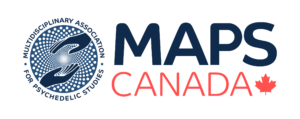MAPS Canada’s policy and advocacy work is led by our volunteer Policy and Advocacy Committee. Our goal is to advocate for progressive, evidence-based drug policy in Canada, with a focus on psychedelic drug policy.
POLICY AND ADVOCACY PRIORITIES
Decriminalization of all drugs
Criminalization of people who use drugs and efforts focusing on supply reduction (prohibition) are policies historically rooted in racism and classism. After over 100 years of criminalization of drugs in Canada, substances are more widely available, potent, and dangerous than ever.
Clearly these policies neither stop drug use nor the production and distribution of drugs. The so-called “War on Drugs” has disproportionately affected Indigenous people, people of colour, and other members of historically marginalized communities.
We believe:
- Drug policies should be based on evidence, and not driven by stereotypes and ideology.
- Possession of drugs in Canada should not be a criminal offence.
- While it is important to consider problematic substance use a health issue and not a criminal one, we shouldn’t replace a criminal system with one of health surveillance.
- Autonomy, respect and rights of people who use drugs should be recognized and supported.
- With respect to psychedelics, decriminalization would allow greater transparency, safety and ethical practice among those practicing “underground” psychedelic therapy.
Equitable access to psychedelic medicine
The field of psychedelic-assisted therapy is rapidly evolving, with new research demonstrating the potential of psychedelics to treat physical and mental conditions, including depression, PTSD, eating disorders, and end of life distress. First Nations in Canada are rediscovering the potential of psychedelics to heal intergenerational trauma among their communities. Ketamine-assisted therapy is legally available in many parts of the country.
Meanwhile, for-profit companies are staking out areas of research and service delivery, and Health Canada is moving towards regulation of MDMA and psilocybin-assisted therapy in the next few years. MAPS Canada supports the development of regulatory schemes that provide equitable access to psychedelics for anyone who needs them, regardless of location or income.
We believe:
- Psychedelic medicines should be legally available through different, culturally appropriate frameworks.
- Equitable access to psychedelics necessitates extra efforts to ensure that Indigenous people, people of colour, people of lower-income, and other historically marginalized communities are provided opportunities to access psychedelic medicines and participate in an evolving psychedelic economy.
- Psychedelic medicine should be legal, regulated, and publicly-funded.
- A regulatory system should incorporate values that recognize the disproportionate harm caused by criminalization of substance and not be entirely driven by for-profit motives.
Psychedelic harm reduction
MAPS Canada supports legal access to psychedelics for medical and non-medical use. We don’t condone the use of psychedelics outside of a legal framework.
We recognize, however, that many people choose to use psychedelics and access unregulated psychedelic experiences despite the fact that those activities are not legal.
Taking substances in unregulated as well as regulated spaces carries with it physical, mental and emotional risks. In order to ensure the safety of our community,
we support education around using psychedelics that can minimize the risk for individuals.
We believe:
- It is the collective responsibility of the psychedelic community to support harm reduction efforts.
- Laws should be changed to allow festival promoters and venues to provide harm reduction services, including drug testing, in order to save lives.
- Abstinence-only drug education does a disservice to young people, and increases the risk to them.
- Drug education should be evidence-based and not only talk about the risks of taking drugs, but also educate youth about how to use drugs more safely if they choose to.
Legal regulation of all drugs
After the War on Drugs ends, we need to have a system of legal regulation of drugs for both medical and non-medical uses. In our society, we regulate all sorts of risky activities, from skydiving to driving.
Failing to regulate them has allowed an unregulated, unsafe, unsupervised market to evolve that has no accountability and pays little attention to quality and potency of substances. Legal regulation allows the government to take back control of this unregulated market with an aim to improve public health and human rights.
The six aims of a legally regulated drug market are:
- Promote public health, safety and justice
- Displace the illegal, unregulated market
- Educate about safer drug use
- Save taxpayers’ money
- Create a safe supply
- Protect youth
We believe:
- We are long overdue in Canada to have a discussion about what legal regulation is and could look like.
- Models for regulation can be created based on how drugs are used and their associated risks.
- Legal regulation is a common-sense approach to evidence-based drug policy.
More information can be found at the Canadian Drug Policy Coalition’s The Regulation Project.
